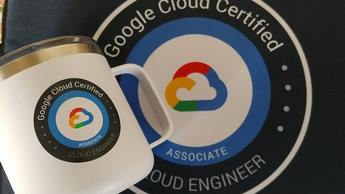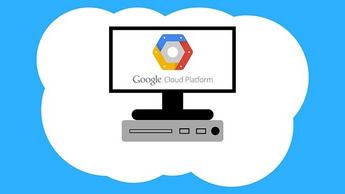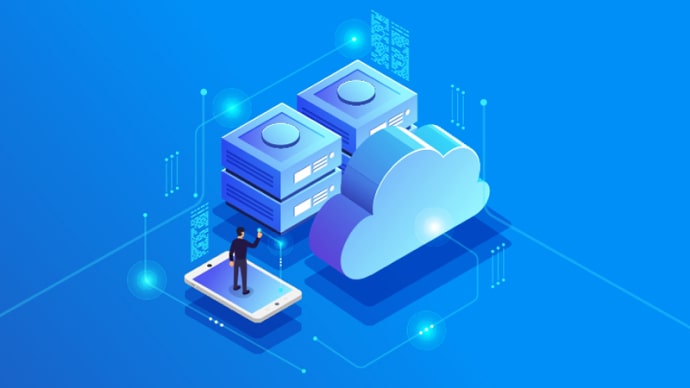
Professional Cloud Architect: Google Cloud Certified - Professional Cloud Architect
PDFs and exam guides are not so efficient, right? Prepare for your Google examination with our training course. The Professional Cloud Architect course contains a complete batch of videos that will provide you with profound and thorough knowledge related to Google certification exam. Pass the Google Professional Cloud Architect test with flying colors.

Curriculum for Professional Cloud Architect Certification Video Course
| Name of Video | Time |
|---|---|
 1. Course Introduction |
02:41 |
 2. What this course will cover and What it wont cover. |
02:17 |
 3. What are the Google Cloud Platform Certifications? GCP Certified |
02:10 |
 4. What is a Google Cloud Platform Certified Architect? |
05:30 |
 5. The Technical Review - High Level -- before we start on specific topics.. |
10:59 |
 6. Signup for a GCP Free Tier |
02:43 |
| Name of Video | Time |
|---|---|
 1. Introduction to Google Cloud Platform |
07:53 |
 2. Demo - GCP Console |
19:51 |
 3. GCP Regions and Zones |
05:12 |
 4. Demo - GCP SDK & CLI |
07:51 |
 5. Demo on Quotas |
01:12 |
 6. GCP Pricing Calculator |
06:20 |
| Name of Video | Time |
|---|---|
 1. Virtual Machines in GCP |
18:59 |
 2. Virtual Machines in GCP - Lecture 2 |
07:26 |
 3. Virtual Machines Console Walkthru |
19:51 |
 4. Demo - Create A VM Instance |
07:25 |
| Name of Video | Time |
|---|---|
 1. Virtual Networking with GCP |
14:21 |
 2. Demo - VPC |
03:42 |
| Name of Video | Time |
|---|---|
 1. Identity Management |
15:24 |
 2. Cloud Identity Proxy |
02:49 |
| Name of Video | Time |
|---|---|
 1. GCP Cloud Resource Manager |
04:48 |
 2. GCP Resources - Zonal, Regional and Multi-Regional |
09:43 |
 3. Demo - GCP Projects |
05:07 |
 4. GCP Billing |
04:41 |
 5. Demo - GCP Billing |
06:56 |
 6. Google Stackdriver Must Know |
16:33 |
 7. Cloud Data Storage Monitoring with Stackdriver |
13:42 |
 8. Demo - Google Stackdriver Demo Must Know Cloud Architect |
19:49 |
| Name of Video | Time |
|---|---|
 1. Containers |
11:38 |
 2. GCP Container Engine Demo |
07:16 |
| Name of Video | Time |
|---|---|
 1. Storage Options Overview |
07:46 |
 2. Cloud Platform Data Storage Security |
07:30 |
 3. Cloud Storage Overview Part 2 |
08:37 |
 4. Storage Basics Demo Part1 |
18:28 |
 5. Storage Basics Demo Part 2 |
06:02 |
 6. Cloud Storage Overview Part 1 of 2 |
18:34 |
 7. Cloud Storage Demo Part 1 of 2 |
16:02 |
 8. Cloud Storage Demo Part 2 of 2 |
12:48 |
 9. Cloud SQL Demo |
13:41 |
 10. Cloud Spanner 101 |
11:03 |
 11. Cloud Datastore Overview |
07:38 |
 12. Cloud Bigtable |
07:16 |
| Name of Video | Time |
|---|---|
 1. App Engine Virtual Machines - PaaS |
04:53 |
 2. App Engine Demo |
08:54 |
 3. Cloud PUB/SUB |
10:21 |
 4. Cloud Endpoints |
02:22 |
 5. Cloud Functions |
05:27 |
 6. Dev Ops |
03:38 |
| Name of Video | Time |
|---|---|
 1. Should you use gsutil or Cloud Storage Transfer Service? |
04:51 |
 2. Cloud Storage Transfer Service |
07:45 |
 3. Cloud Storage Migrate Buckets from GCP Regions - Demo |
11:36 |
 4. Gsutil |
03:10 |
 5. GCSFUSE |
02:34 |
 6. Offline Media Import / Export |
01:50 |
| Name of Video | Time |
|---|---|
 1. Rightscale Cloud Compare |
06:07 |
 2. Tips For preparing - Console, White Papers and Resources to study for Exam |
14:06 |
 3. Case Studies on Exam |
03:02 |
 4. How to sign up for the exam |
02:11 |
 5. Using Qwiklabs to learn hands on (Cost involved) |
07:06 |
 6. Google Cloud Icon Library for GCP Cloud Architecture |
05:50 |
 7. Finding Help with Stackoverflow |
03:00 |
 8. Using Codelabs to Learn some GCP for FREE |
03:05 |
| Name of Video | Time |
|---|---|
 1. Exam Question Preparation and Review |
14:04 |
Google Professional Cloud Architect Exam Dumps, Practice Test Questions
100% Latest & Updated Google Professional Cloud Architect Practice Test Questions, Exam Dumps & Verified Answers!
30 Days Free Updates, Instant Download!
Professional Cloud Architect Premium Bundle

- Premium File: 346 Questions & Answers. Last update: Feb 21, 2026
- Training Course: 63 Video Lectures
- Latest Questions
- 100% Accurate Answers
- Fast Exam Updates
Google Professional Cloud Architect Training Course
Want verified and proven knowledge for Google Cloud Certified - Professional Cloud Architect? Believe it's easy when you have ExamSnap's Google Cloud Certified - Professional Cloud Architect certification video training course by your side which along with our Google Professional Cloud Architect Exam Dumps & Practice Test questions provide a complete solution to pass your exam Read More.
Mastering Google Professional Cloud Architect: Ultimate Training Guide for Cloud Careers
Transform into a Google Cloud Platform (GCP) Architect: Design and Implement Scalable GCP Solutions with 4 Updated Case Studies
Course Overview
The Google Professional Cloud Architect training course is designed to provide IT professionals, software engineers, and cloud enthusiasts with a comprehensive understanding of designing, building, and managing secure and scalable cloud solutions on Google Cloud Platform. In this course, learners will explore the principles of cloud architecture, gain practical experience with Google Cloud services, and develop the skills necessary to become certified as a Professional Cloud Architect.
Cloud computing has become the backbone of modern IT infrastructure, enabling organizations to scale efficiently, innovate rapidly, and reduce operational costs. Google Cloud Platform offers a wide array of services that support computing, storage, networking, security, and analytics. Understanding how to architect solutions in this environment is critical for organizations seeking to achieve agility and reliability in the cloud.
This course emphasizes both conceptual knowledge and hands-on practice. Learners will understand how to design robust architectures, implement cloud solutions that meet business requirements, and manage resources effectively while ensuring security and compliance. The course content is structured to progressively build expertise, from foundational concepts to advanced architectural strategies.
Participants will be guided through real-world scenarios, case studies, and lab exercises that simulate professional cloud architect responsibilities. The course is ideal for individuals seeking to enhance their cloud skills and gain certification recognition that validates their ability to design and deploy Google Cloud solutions effectively.
What You Will Learn From This Course
By completing this course, participants will gain a deep understanding of cloud architecture on Google Cloud Platform. Learners will be able to:
Develop scalable, secure, and resilient cloud solutions that meet organizational requirements
Understand core Google Cloud services including Compute Engine, App Engine, Cloud Storage, BigQuery, and Kubernetes Engine
Design architectures that optimize performance, cost, and reliability for cloud workloads
Implement identity and access management policies and enforce security best practices
Deploy hybrid and multi-cloud networking solutions that ensure connectivity and high availability
Monitor and maintain cloud environments using Google Cloud’s management and monitoring tools
Prepare for the Professional Cloud Architect certification exam with hands-on labs and practice scenarios
Apply industry-standard cloud design patterns to real-world use cases
This course provides a comprehensive roadmap for mastering the responsibilities of a professional cloud architect. The combination of theoretical knowledge and practical exercises ensures learners can confidently apply concepts to both exam preparation and real-world implementation.
Learning Objectives
The primary learning objectives of this course are to equip participants with the expertise needed to design, deploy, and manage cloud solutions on Google Cloud Platform. Upon successful completion, learners will be able to:
Identify the appropriate Google Cloud services for specific business use cases
Design high-performance, cost-effective, and secure cloud architectures
Implement best practices for cloud storage, data processing, and analytics
Configure virtual networks, firewalls, and load balancing for optimal connectivity
Apply security principles and compliance standards to cloud deployments
Use monitoring and logging tools to ensure operational efficiency
Develop strategies for disaster recovery and business continuity in cloud environments
Prepare for scenario-based questions on the Professional Cloud Architect exam
The learning objectives are aligned with the real-world responsibilities of cloud architects, ensuring that participants gain practical knowledge they can immediately apply in professional settings.
Requirements
To maximize the benefit of this course, learners are expected to have a foundational understanding of IT concepts and basic cloud computing principles. The requirements include:
Familiarity with general IT infrastructure concepts, including servers, storage, and networking
Basic understanding of virtualization and cloud computing models such as IaaS, PaaS, and SaaS
Knowledge of programming or scripting fundamentals, preferably in languages such as Python, Java, or Go
Experience with databases, including SQL and NoSQL systems, is recommended
Access to a Google Cloud Platform account to perform hands-on labs and practice exercises
While prior experience with Google Cloud Platform is helpful, it is not mandatory. This course is structured to provide sufficient guidance for learners at all levels to gain proficiency and confidence in cloud architecture practices.
Course Description
The Google Professional Cloud Architect course is a structured, in-depth training program designed to teach participants how to effectively design, deploy, and manage cloud solutions on Google Cloud Platform. The course covers the full spectrum of cloud architecture, including computing, storage, networking, security, monitoring, and cost management.
Learners begin with foundational topics, exploring the core principles of cloud computing and the architecture of Google Cloud Platform. The course then progresses to more advanced topics, including designing scalable, resilient, and secure cloud solutions tailored to business requirements.
Practical labs and real-world scenarios are integrated throughout the course to reinforce conceptual knowledge and provide hands-on experience. Participants learn to implement cloud services such as Compute Engine for virtual machines, App Engine for application deployment, Kubernetes Engine for container orchestration, Cloud Storage for scalable data management, and BigQuery for analytics.
Security and compliance are emphasized as integral aspects of cloud architecture. Learners gain experience configuring identity and access management policies, encrypting data, and implementing network security controls. Networking concepts such as VPCs, firewalls, load balancing, and hybrid cloud connectivity are covered in detail, preparing learners to design secure and high-performing networks.
The course also addresses operational excellence, including monitoring, logging, cost management, and disaster recovery planning. By combining theoretical knowledge with hands-on practice, participants acquire the skills necessary to manage cloud solutions effectively while maintaining performance, security, and cost efficiency.
Throughout the course, learners are guided toward preparing for the Professional Cloud Architect certification, gaining insights into exam structure, common question types, and best practices for scenario-based problem solving. The course equips participants to take on the role of a professional cloud architect confidently and successfully.
Target Audience
This course is intended for professionals who want to advance their careers in cloud computing and specialize in Google Cloud architecture. The target audience includes:
IT professionals and system administrators seeking to transition to cloud roles
Software engineers and developers who want to design and deploy cloud-native applications
Solutions architects responsible for designing scalable and secure cloud environments
DevOps engineers aiming to implement cloud automation, monitoring, and deployment strategies
Business analysts and technical managers looking to understand cloud architecture for strategic decision-making
Students and cloud enthusiasts preparing for the Professional Cloud Architect certification
By focusing on both technical skills and practical application, the course is suitable for individuals with varying levels of experience, from those with foundational IT knowledge to experienced professionals seeking advanced cloud expertise.
Prerequisites
While this course is accessible to learners at different stages of their cloud journey, certain prerequisites are recommended to ensure a smooth learning experience:
Understanding of networking concepts such as TCP/IP, DNS, load balancing, and firewalls
Familiarity with operating systems, particularly Linux and Windows environments
Basic knowledge of cloud computing models (IaaS, PaaS, SaaS) and virtualization
Experience with programming or scripting languages for automation and deployment tasks
Awareness of database concepts, including relational and non-relational systems
Willingness to engage in hands-on labs and cloud projects using Google Cloud Platform
Having these prerequisites allows participants to focus on cloud architecture design, security, networking, and operational management without being hindered by gaps in fundamental IT knowledge. The course provides supplemental resources for learners who wish to strengthen their foundational skills before diving into advanced topics.
Course Modules/Sections
The Google Professional Cloud Architect training course is divided into several modules and sections, each carefully designed to build learners’ expertise progressively. These modules provide a comprehensive framework to cover both theoretical knowledge and practical application of cloud architecture principles.
The course begins with foundational modules that introduce participants to the core concepts of cloud computing, the structure of Google Cloud Platform, and the role of a cloud architect. These early sections focus on establishing a solid understanding of cloud infrastructure, virtualized computing, and the principles of designing cloud-native solutions. Learners are introduced to the essential services offered by Google Cloud, including computing, storage, databases, networking, and security tools.
Following the foundational modules, the course transitions into intermediate and advanced sections. These modules delve deeper into designing and implementing scalable, secure, and resilient cloud solutions. Participants explore advanced topics such as hybrid and multi-cloud networking, automation and orchestration using Kubernetes, and implementing best practices for high availability and disaster recovery. Real-world case studies and hands-on labs are integrated into these modules to ensure learners can translate theoretical concepts into practical solutions.
Another critical set of modules is dedicated to security and compliance. These sections cover identity and access management, encryption, security monitoring, and adherence to industry compliance standards. By completing these modules, participants gain the skills necessary to protect organizational assets, enforce security policies, and maintain regulatory compliance within the cloud environment.
Operational excellence modules focus on monitoring, logging, performance optimization, and cost management. Learners develop the ability to maintain cloud environments efficiently while balancing performance, security, and budgetary considerations. The final modules of the course prepare learners for the Professional Cloud Architect certification exam by covering exam strategies, scenario-based questions, and review exercises.
Each module includes structured learning paths, practical exercises, and assessments to reinforce knowledge and evaluate understanding. By progressing through these modules, participants build the comprehensive skill set required for designing, deploying, and managing cloud solutions on Google Cloud Platform.
Key Topics Covered
The course covers a wide range of key topics to ensure participants develop a complete understanding of cloud architecture. The curriculum is designed to address the technical and operational aspects of designing, implementing, and managing cloud solutions.
Core Google Cloud Services: Learners explore essential services such as Compute Engine for virtual machines, App Engine for application deployment, Cloud Functions for serverless computing, Cloud Storage for scalable data storage, and BigQuery for analytics and data processing. Participants gain practical knowledge in choosing the right services for specific workloads and integrating them to build comprehensive solutions.
Cloud Architecture Design: This topic focuses on designing high-performance, cost-effective, and resilient cloud solutions. Participants learn how to implement scalable architectures using multi-region deployments, load balancing, auto-scaling, and containerized solutions. Design patterns and best practices for cloud architecture are emphasized to ensure solutions meet business objectives efficiently.
Networking and Connectivity: Learners study virtual private clouds (VPCs), subnets, routing, and network security controls. Hybrid and multi-cloud networking strategies are also covered, enabling participants to design robust and secure network architectures that connect cloud and on-premises resources seamlessly. Load balancing, DNS management, interconnects, and VPNs are explored in depth.
Security and Compliance: Security is integrated into every aspect of the course. Topics include identity and access management (IAM), encryption at rest and in transit, firewall configuration, security monitoring, and adherence to compliance standards such as GDPR and HIPAA. Learners gain the ability to design secure cloud environments while protecting sensitive data and maintaining compliance.
Monitoring and Operational Management: Participants learn to use Google Cloud monitoring and logging tools to track performance, identify issues, and maintain operational efficiency. Cost management techniques and strategies for optimizing resource utilization are emphasized. Disaster recovery planning, backup strategies, and operational best practices are also covered to ensure business continuity.
Automation and Orchestration: The course explores containerization with Kubernetes Engine, serverless architecture with Cloud Functions, and automated deployment pipelines with Cloud Build and CI/CD strategies. Participants learn how to implement efficient automation workflows, streamline deployment processes, and reduce operational complexity.
Data and Analytics: BigQuery, Cloud SQL, Cloud Spanner, and other data management services are covered. Learners gain skills in processing large datasets, running analytics, and integrating data-driven solutions into cloud architectures. Topics include database selection, query optimization, and implementing scalable analytics workflows.
Exam Preparation: Finally, the course includes targeted preparation for the Professional Cloud Architect certification exam. Participants review scenario-based questions, case studies, and exam strategies to ensure readiness. The emphasis is on applying learned concepts to solve complex real-world problems.
These key topics provide learners with a comprehensive understanding of cloud architecture, equipping them with the skills to design and manage cloud solutions that are secure, scalable, and optimized for business needs.
Teaching Methodology
The teaching methodology for this course is designed to provide a balance between theoretical knowledge and practical application. Participants engage in a mix of instructor-led sessions, hands-on labs, case studies, and interactive exercises. This approach ensures that learners not only understand cloud concepts but also gain the ability to implement them in real-world scenarios.
Instructor-Led Training: Experienced instructors guide learners through the curriculum, providing explanations of concepts, demonstrations of services, and insights into best practices. Participants have the opportunity to ask questions, discuss challenges, and receive feedback in real time.
Hands-On Labs: Practical exercises are integrated throughout the course to reinforce theoretical knowledge. Participants work directly with Google Cloud Platform services, creating virtual machines, configuring networks, deploying applications, and managing databases. Labs simulate real-world scenarios, enabling learners to apply skills in controlled environments.
Case Studies: Real-world case studies illustrate how organizations design and implement cloud solutions using Google Cloud Platform. Participants analyze these scenarios, identify best practices, and propose optimized architectures. Case studies help learners understand the business and operational considerations behind architectural decisions.
Interactive Exercises: Interactive exercises, quizzes, and group activities are included to enhance engagement and reinforce learning. These exercises encourage participants to think critically, solve problems collaboratively, and develop practical skills that are directly applicable to their professional roles.
Self-Paced Learning Materials: In addition to instructor-led sessions, learners have access to self-paced learning materials such as video tutorials, reading resources, and online exercises. These materials allow participants to review concepts at their own pace and revisit topics as needed to strengthen understanding.
Scenario-Based Practice: To prepare for the certification exam and real-world responsibilities, learners engage in scenario-based practice. Participants are presented with complex architectural challenges and must design solutions that address performance, security, cost, and operational requirements. This approach develops problem-solving skills and reinforces comprehensive knowledge.
Continuous Feedback: Participants receive ongoing feedback from instructors and peers throughout the course. Feedback focuses on technical proficiency, architectural design choices, and problem-solving approaches. This ensures learners can identify areas for improvement and track their progress.
The combination of these teaching methods ensures a holistic learning experience, equipping participants with both the conceptual understanding and practical skills necessary to succeed as professional cloud architects.
Assessment & Evaluation
Assessment and evaluation are integral components of the course, designed to measure learners’ understanding of concepts, their ability to apply knowledge in practical scenarios, and their readiness for certification.
Quizzes and Knowledge Checks: Short quizzes and knowledge checks are administered at the end of each module to evaluate comprehension of key concepts. These assessments help learners identify areas where additional review may be needed and reinforce retention of critical information.
Hands-On Lab Evaluation: Practical labs are evaluated based on accuracy, efficiency, and adherence to best practices. Participants must demonstrate their ability to deploy and manage cloud resources, configure networking and security, and optimize solutions according to business requirements. Feedback is provided to ensure continuous improvement.
Case Study Analysis: Learners analyze case studies and submit architectural design proposals. These assessments evaluate participants’ ability to understand complex business requirements, design appropriate solutions, and justify architectural decisions. Instructors provide feedback on technical accuracy, scalability, security considerations, and cost optimization.
Scenario-Based Exams: To simulate real-world challenges and prepare for the Professional Cloud Architect certification, scenario-based exams are included. Participants are presented with detailed scenarios and must propose cloud solutions that meet specified performance, security, and operational goals. Evaluations focus on problem-solving, design thinking, and the application of best practices.
Participation and Engagement: Active participation in discussions, interactive exercises, and collaborative projects is monitored and evaluated. Engagement metrics help instructors assess learners’ commitment, critical thinking, and collaborative skills.
Final Assessment: At the end of the course, a comprehensive final assessment evaluates overall proficiency across all modules. This assessment combines theoretical questions, practical labs, and scenario-based problem solving to ensure participants have mastered the knowledge and skills required for professional cloud architecture.
Continuous Feedback Loop: Throughout the course, learners receive feedback on assessments, lab work, and participation. This continuous feedback loop ensures that participants can address knowledge gaps, refine skills, and build confidence in their ability to design and manage cloud solutions effectively.
The assessment and evaluation strategy is carefully designed to align with both the learning objectives of the course and the requirements of the Professional Cloud Architect certification. Participants are supported through structured feedback, targeted exercises, and practical evaluations that mirror real-world responsibilities and exam scenarios.
Benefits of the Course
The Google Professional Cloud Architect training course offers numerous benefits to individuals seeking to expand their expertise in cloud computing and advance their careers. Participants gain comprehensive knowledge and practical skills in designing, deploying, and managing cloud solutions using Google Cloud Platform.
One of the primary benefits of the course is the ability to design scalable, secure, and efficient cloud architectures. By learning to implement best practices in computing, storage, networking, and security, participants can create solutions that meet the specific needs of organizations while maintaining reliability and performance. This skill set is highly valuable as businesses increasingly migrate critical workloads to cloud environments.
Participants also gain hands-on experience with Google Cloud services, including Compute Engine, App Engine, Cloud Storage, Kubernetes Engine, and BigQuery. The practical exercises and labs allow learners to understand service capabilities, configuration options, and integration techniques, ensuring they can apply their knowledge effectively in real-world scenarios. This practical experience reinforces theoretical concepts and prepares participants for the challenges of professional cloud architecture roles.
Another significant benefit is the preparation for the Professional Cloud Architect certification exam. The course is aligned with the certification objectives, providing scenario-based exercises, case studies, and review sessions that mirror the exam structure. Achieving certification demonstrates mastery of Google Cloud architecture, making participants more competitive in the job market and opening opportunities for higher-level roles in cloud strategy and design.
The course also emphasizes operational excellence, teaching participants how to monitor performance, optimize costs, and maintain cloud environments efficiently. Learners gain insights into disaster recovery planning, business continuity, and proactive management of cloud resources, enabling them to minimize risks and ensure reliable service delivery.
Security and compliance knowledge is another key benefit. Participants learn how to configure identity and access management policies, enforce data encryption, and implement network security controls while adhering to industry standards such as GDPR and HIPAA. This expertise helps organizations safeguard sensitive data and meet regulatory requirements.
Furthermore, the course enhances problem-solving and critical thinking skills. Scenario-based exercises, case studies, and interactive activities encourage participants to analyze complex requirements, design effective solutions, and make informed decisions. These skills are applicable beyond cloud architecture roles, supporting broader IT strategy and organizational decision-making.
Finally, the course provides a strong foundation for career growth. By mastering Google Cloud architecture, participants can pursue roles such as cloud architect, solutions architect, cloud engineer, and cloud consultant. Organizations increasingly value professionals who can combine technical proficiency with strategic thinking to deliver high-quality cloud solutions, making this course a valuable investment in professional development.
Course Duration
The Google Professional Cloud Architect training course is designed to provide a thorough and immersive learning experience. The duration of the course depends on the learning format and the participant’s pace, but typically ranges between eight to twelve weeks for full-time learners.
The course is structured to allow participants to progress through modules sequentially, ensuring a comprehensive understanding of each topic before moving on to more advanced subjects. Each module includes a combination of lectures, hands-on labs, case studies, and interactive exercises to reinforce learning. On average, learners can expect to dedicate three to four hours per week for guided instruction and an additional two to three hours per week for self-paced study and practice exercises.
For participants who prefer a self-paced learning format, the course may extend over a longer period. Self-paced learners have access to video tutorials, online exercises, and lab environments that allow them to review concepts, revisit challenging topics, and practice at their convenience. This flexibility ensures that learners with varying schedules and commitments can complete the course successfully.
In addition to the instructional hours, learners should plan for time to complete scenario-based exercises, quizzes, and practice exams. These activities are essential for reinforcing understanding and preparing for the Professional Cloud Architect certification. Participants who dedicate consistent time and effort to these activities are more likely to achieve mastery and pass the certification exam with confidence.
The course also incorporates periodic assessments to evaluate knowledge retention and application skills. These assessments provide benchmarks for learners to track their progress and identify areas requiring additional focus. The combination of instructional hours, self-paced practice, and assessments ensures that participants gain a deep and practical understanding of cloud architecture concepts and practices.
Overall, the course duration is designed to provide sufficient time for participants to build expertise while maintaining flexibility to accommodate different learning preferences. By following the recommended schedule and actively engaging with the course materials, learners can develop the skills needed to succeed as professional cloud architects.
Tools & Resources Required
To maximize the learning experience and fully engage with the Google Professional Cloud Architect course, participants require access to specific tools and resources. These tools facilitate hands-on practice, experimentation, and application of cloud architecture concepts.
Google Cloud Platform Account: A GCP account is essential for completing practical labs and exercises. Participants will use the account to provision virtual machines, deploy applications, configure networking, and manage storage and databases. Access to GCP ensures learners gain real-world experience with the platform’s services and features.
Development Environment: Participants should have a development environment configured on their local machines. This may include an integrated development environment (IDE) such as Visual Studio Code, PyCharm, or Eclipse. The development environment supports scripting, application deployment, and interaction with cloud services.
Web Browser: A modern web browser such as Google Chrome or Firefox is required to access the Google Cloud Console, web-based tutorials, documentation, and online labs. Compatibility with cloud tools and web applications ensures a smooth learning experience.
Command-Line Tools: Knowledge of command-line tools such as Cloud SDK (gcloud), Kubernetes CLI (kubectl), and other scripting utilities is recommended. These tools allow participants to interact with Google Cloud services programmatically, automate tasks, and manage resources efficiently.
Collaboration Tools: For group exercises and collaborative projects, participants may need access to communication and collaboration tools such as Google Workspace, Slack, or Microsoft Teams. These tools facilitate teamwork, discussion, and sharing of ideas, enhancing the learning experience.
Reference Materials: Access to Google Cloud documentation, whitepapers, and tutorials provides supplementary guidance and reference material. These resources support deeper exploration of topics, troubleshooting, and understanding of advanced concepts.
Hardware Requirements: Participants should have a computer with adequate processing power, memory, and storage to support development, virtualization, and cloud interactions. A stable internet connection is also necessary for accessing cloud resources, completing labs, and participating in online sessions.
Additional Resources: Depending on the course format, participants may have access to video tutorials, practice exams, and interactive exercises provided by the training platform. These resources reinforce learning and allow participants to practice exam-style questions in preparation for certification.
By ensuring access to these tools and resources, participants can fully engage with the course content, gain practical experience, and develop the skills necessary to design, deploy, and manage cloud solutions effectively. Proper preparation with the required tools also enhances the ability to complete labs, projects, and scenario-based exercises efficiently.
Career Opportunities
Completing the Google Professional Cloud Architect training course opens up a wide range of career opportunities in cloud computing and IT architecture. Organizations across industries are increasingly adopting cloud technologies, and there is a high demand for professionals who can design, deploy, and manage secure, scalable, and efficient cloud solutions on Google Cloud Platform.
One of the primary roles available to certified cloud architects is that of a cloud architect or solutions architect. Professionals in these roles are responsible for designing end-to-end cloud solutions, integrating various services such as Compute Engine, Cloud Storage, BigQuery, and Kubernetes Engine, and ensuring solutions meet business objectives for performance, security, and scalability. Cloud architects collaborate with developers, IT teams, and business stakeholders to create architectures that support organizational goals while adhering to best practices.
Cloud engineering is another career path available to graduates of this course. Cloud engineers implement and maintain cloud infrastructure, manage deployments, and ensure operational efficiency. They work with tools for continuous integration and continuous deployment, container orchestration, network configuration, and monitoring, gaining expertise in both cloud services and automation.
DevOps roles are also well-suited for those completing this training. DevOps engineers focus on automating deployment processes, managing infrastructure as code, and monitoring cloud environments. Skills learned in this course, such as designing scalable solutions, implementing security policies, and monitoring operational performance, are directly applicable to DevOps responsibilities.
Data architecture and analytics roles are a natural extension for those interested in data-driven cloud solutions. With proficiency in BigQuery, Cloud SQL, and other Google Cloud data services, learners can pursue roles as data architects or cloud data engineers. These professionals design, manage, and optimize data pipelines, implement scalable analytics solutions, and provide insights that drive business decisions.
Security-focused career opportunities are also abundant. Cloud security engineers and cloud compliance specialists are responsible for enforcing security policies, monitoring for threats, and ensuring regulatory compliance. Knowledge of identity and access management, encryption, network security, and audit practices enables learners to excel in these roles.
Professional cloud architects are increasingly sought after for strategic roles in IT leadership. Organizations value individuals who can bridge technical expertise with business strategy, guiding decision-making for cloud adoption, cost optimization, and technology innovation. Career progression may lead to positions such as cloud strategy consultant, director of cloud operations, or chief cloud architect, offering opportunities to shape organizational cloud strategy at a high level.
Beyond technical positions, completing this course enhances overall employability in IT and technology management. The combination of cloud architecture knowledge, hands-on experience, and certification demonstrates a professional’s ability to handle complex technology challenges, making them highly competitive in a global job market.
Enroll Today
Enrolling in the Google Professional Cloud Architect training course is the first step toward building a rewarding career in cloud computing. The course provides a structured, hands-on learning path designed to equip participants with the skills needed to design, deploy, and manage advanced cloud solutions on Google Cloud Platform.
Enrollment is simple and can be completed through authorized training platforms, Google Cloud learning portals, or professional education providers. Participants typically have the option to choose between instructor-led sessions, self-paced learning, or a hybrid approach that combines the benefits of both formats. This flexibility ensures that learners can select a schedule and format that aligns with their professional commitments and learning preferences.
Upon enrollment, participants gain immediate access to course materials, hands-on labs, video tutorials, and learning resources. These resources allow learners to begin exploring core Google Cloud services, practicing deployment scenarios, and developing architectural designs from the very first module. Early engagement with the platform accelerates skill acquisition and reinforces learning throughout the course.
Enrollment also grants access to experienced instructors and support staff who guide participants through the course content, answer questions, provide feedback on labs and exercises, and share insights from real-world cloud architecture projects. This guidance is invaluable for mastering complex topics and ensuring readiness for certification.
Participants are encouraged to actively engage with interactive exercises, case studies, and collaborative projects. These activities foster practical skills, critical thinking, and problem-solving abilities. Learners can track their progress through periodic assessments and receive feedback that helps them identify areas for improvement and reinforce key concepts.
Additionally, enrolling in the course positions participants to prepare effectively for the Professional Cloud Architect certification exam. The training aligns with certification objectives, providing scenario-based practice, exam tips, and review materials to ensure learners are well-prepared to demonstrate their expertise in a professional setting.
By enrolling today, participants take a significant step toward advancing their careers in cloud computing. The combination of comprehensive training, hands-on practice, and certification preparation ensures that learners acquire the knowledge, skills, and confidence needed to excel as professional cloud architects.
The demand for skilled cloud architects continues to grow across industries, making enrollment a strategic investment in professional development. Participants who complete the course and earn certification gain a competitive advantage in the job market, access to high-paying roles, and opportunities for career progression in cloud strategy, architecture, and technology leadership.
Prepared by Top Experts, the top IT Trainers ensure that when it comes to your IT exam prep and you can count on ExamSnap Google Cloud Certified - Professional Cloud Architect certification video training course that goes in line with the corresponding Google Professional Cloud Architect exam dumps, study guide, and practice test questions & answers.
Purchase Individually



Google Training Courses













Only Registered Members can View Training Courses
Please fill out your email address below in order to view Training Courses. Registration is Free and Easy, You Simply need to provide an email address.
- Trusted by 1.2M IT Certification Candidates Every Month
- Hundreds Hours of Videos
- Instant download After Registration






